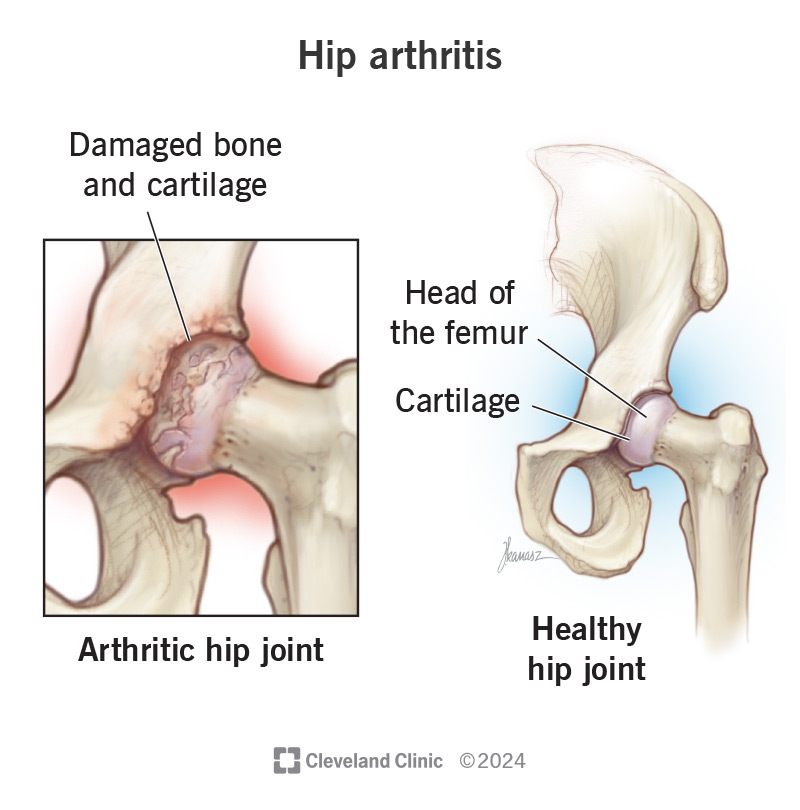Hip arthritis is usually osteoarthritis, a degenerative disease that affects the cartilage in your joint. Sometimes, rheumatic (inflammatory) arthritis can also affect your hip. Exercise and lifestyle changes are essential to managing arthritis pain and maintaining your mobility. Medications and surgery can help when these are no longer enough.
Advertisement
Cleveland Clinic is a non-profit academic medical center. Advertising on our site helps support our mission. We do not endorse non-Cleveland Clinic products or services. Policy

Image content: This image is available to view online.
View image online (https://my.clevelandclinic.org/-/scassets/images/org/health/articles/hip-arthritis)
Hip arthritis is pain and stiffness in your hip joint, related to the soft tissues in the joint. It usually affects the cartilage that cushions your joint, and sometimes the synovial membrane that lubricates it. Arthritis causes inflammation and swelling in these tissues, or it wears them down, or both. If they wear down, your joint won’t have enough padding or lubrication when it moves. Swelling may make the joint stiff.
Advertisement
Cleveland Clinic is a non-profit academic medical center. Advertising on our site helps support our mission. We do not endorse non-Cleveland Clinic products or services. Policy
Most of the time, arthritis of the hip is osteoarthritis, which is simple wear and tear on the joint. Less commonly, inflammatory types of arthritis may affect your hips — like rheumatoid arthritis. This is a different type of disease. Typically, inflammatory arthritis will affect many parts of your body at once, not just large joints like your hips. Besides joint pain, these conditions often cause other symptoms, too.
Types of inflammatory arthritis that may affect your hip include:
Osteoarthritis affects the majority of people older than 55, and the hip joint is the second most common joint that osteoarthritis affects. Osteoarthritis of the hip may affect up to 25% of people older than 55. The average age for developing it is 65. Inflammatory types of arthritis are more likely to appear earlier.
Arthritis in your hip can cause:
Advertisement
You might feel hip arthritis pain in areas surrounding your hip joint. This is called referred pain. Sometimes, it seems to move from one area to another. Many people feel hip arthritis pain in their:
Osteoarthritis often affects just one hip at a time. Inflammatory arthritis often affects both hips, and other joints besides. If you have osteoarthritis in one hip, you won’t necessarily get it in the other.
Osteoarthritis of the hip is mostly the result of normal wear and tear on your hip joint. Our hips bear a lot of weight and stress throughout our lives from normal activities like walking, sitting down and standing up. As we age, it’s common for the cartilage in our hip joints to start to wear down.
But some people do have more wear and tear on their joints than others, and at earlier ages. Lifestyle factors, genetic factors, injuries and diseases may contribute to wearing down the cartilage in your joint sooner. These factors can increase your risk of developing hip arthritis over your lifetime.
Risk factors for developing osteoarthritis of the hip include:
Inflammatory arthritis isn’t due to wear and tear, although the inflammation can trigger degenerative changes in your joints. Most inflammatory conditions are autoimmune disorders. This means that your immune system malfunctions and attacks your own tissues, triggering inflammation in your joints.
Risk factors for developing inflammatory arthritis include:
Diagnosing hip arthritis begins with a survey of your symptoms and a physical examination of your hip joint. A healthcare provider will test your range of motion and your pain levels and observe how you walk. Then, they’ll take X-rays to look for signs of swelling, erosion or other degenerative changes in your joint. If they suspect inflammatory arthritis, you might have blood tests to check for certain indicators.
The best treatment for hip arthritis depends on the type and how severe it is. Regardless of the type, healthcare providers usually start by recommending conservative therapies and lifestyle changes.
Conservative treatment for hip arthritis includes:
Advertisement
As arthritis progresses, your provider might suggest therapeutic injections or medications to slow it down.
Prescription treatments for hip arthritis include:
When other treatments are no longer effective, joint replacement surgery can offer relief.
Surgical treatments for hip arthritis include:
Advertisement
There’s no cure for osteoarthritis, but conservative treatments can help manage the symptoms. When conservative treatments fail, hip replacement surgery can reliably eliminate the symptoms of hip osteoarthritis. Depending on your age, your hip replacement may last the rest of your life. Younger people may need another surgery after several decades, as the prosthesis wears out over time.
Activities to avoid with hip arthritis include:
Arthritis can be debilitating, especially when it affects a joint that you depend on for everyday mobility. Unmanaged arthritis pain might make it hard to do your job or participate in activities you enjoy. This can depress your quality of life. But living like this isn’t inevitable, even if you’re getting older. Hip arthritis care has made great advances. With quality care, you can get your mobility and life back.
Advertisement

Sign up for our Health Essentials emails for expert guidance on nutrition, fitness, sleep, skin care and more.
Learn more about the Health Library and our editorial process.
Cleveland Clinic’s health articles are based on evidence-backed information and review by medical professionals to ensure accuracy, reliability and up-to-date clinical standards.
Cleveland Clinic’s health articles are based on evidence-backed information and review by medical professionals to ensure accuracy, reliability and up-to-date clinical standards.
When you have an inflammatory or autoimmune condition, you need experts by your side. At Cleveland Clinic, we’ll create an individualized treatment plan for you.
